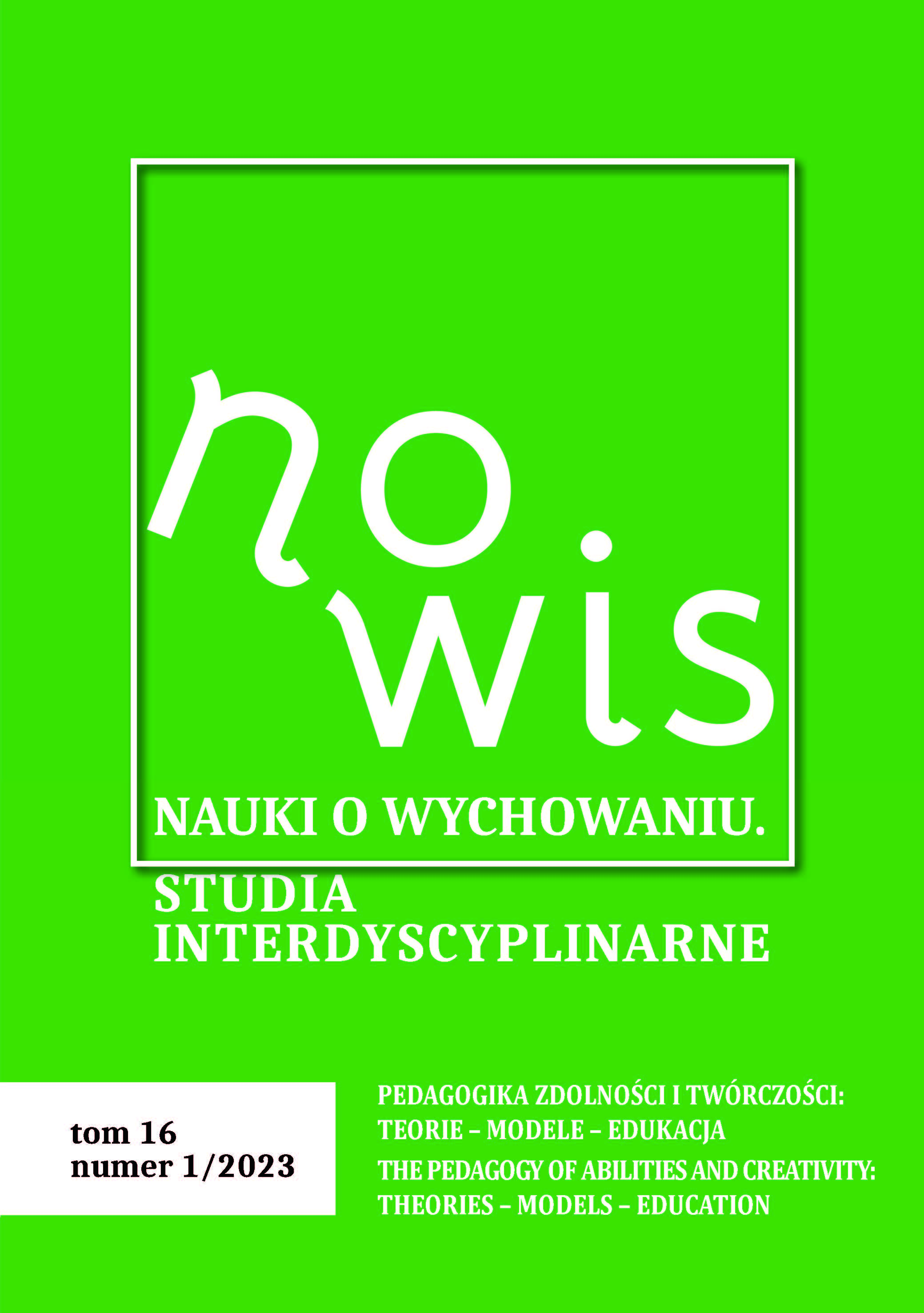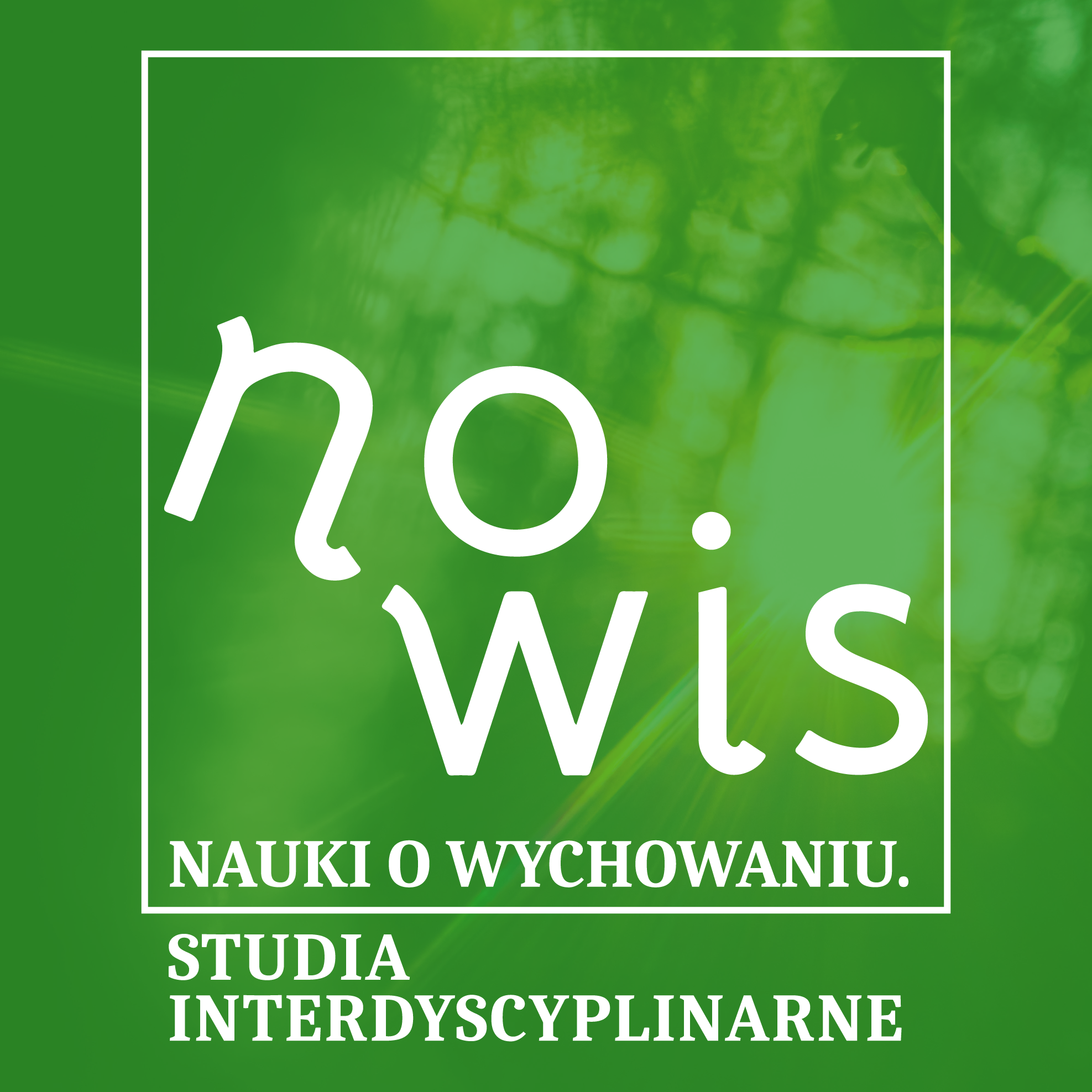Postrzeganie uczniów zdolnych przez nauczycieli klas I–III w Polsce. Wstępne wyniki badań empirycznych
DOI :
https://doi.org/10.18778/2450-4491.16.15Mots-clés :
paradygmaty zdolności, identyfikacja uczniów zdolnych z klas początkowych, uczeń zdolny w młodszym wieku szkolnymRésumé
W artykule prezentowane są wstępne wyniki internetowych badań ankietowych przeprowadzonych w maju i czerwcu 2022 roku wśród 484 nauczycieli klas początkowych. Referowane wyniki skoncentrowane są na ustaleniu: jakie charakterystyki (cechy i zachowania) najmłodszych uczniów postrzegane są przez nauczycieli jako markery zdolności oraz czy i jak wzory identyfikowania zdolności uczniów różnicowane są przez doświadczenie zawodowe nauczycieli i cechy szkół, w których pracują. Zastosowanie eksploracyjnej analizy czynnikowej pozwoliło ustalić, jakie ukryte teoretyczne koncepty zdolności daje się wyodrębnić na podstawie wyborów charakterystyk uczniów zdolnych. Artykuł inspirowany jest badaniami przeprowadzonymi przez The National Research Center on the Gifted and Talented (Brighton et al. 2007) w roku 2003 oraz ożywioną na przełomie XX i XXI wieku dyskusją, przede wszystkim w USA, dotyczącą zmian w paradygmatach zdolności i paradygmatach edukacji zdolności (gifted education) oraz roli nauczycieli w rozwijaniu zdolności i talentów.
Références
Ambrose D., Sternberg R. S. (red.) (2016) Giftedness and Talent in the 21st Century. Adopting to the Turbulance of Globalization, Rotterdam–Boston–Taipei, Sense Publishers, https://doi.org/10.1007/978-94-6300-503-6
View in Google Scholar
DOI: https://doi.org/10.1007/978-94-6300-503-6
Borland J. H. (2003) The Death of Giftedness w: J. H. Borland (red.) Rethinking Gifted Education, New York, NY, Teachers College Press, s. 105–124.
View in Google Scholar
Brighton C. M., Moon T. R., Jarvis J. M., Hockett J. A. (2007) Primary Grade Teachers’ Conceptions of Giftedness and Talent: A Case-Based Investigation, Storrs, University of Connecticut, The National Research Center on the Gifted and Talented.
View in Google Scholar
Callahan C. M., Hertberg-Davis H. L. (red.) (2018) Fundamentals of Gifted Education: Considering Multiple Perspectives, New York, London, Routledge Taylor & Francis Group, https://doi.org/10.4324/9781315639987
View in Google Scholar
DOI: https://doi.org/10.4324/9781315639987
Cieślikowska J., Limont W. (2010) Obraz ucznia zdolnego w potocznych koncepcjach nauczycieli w: W. Limont, J. Cieślikowska, J. Dreszer (red.) Osobowościowe i środowiskowe uwarunkowania rozwoju ucznia zdolnego, t. 2, Toruń, Wydawnictwo Naukowe Uniwersytetu Mikołaja Kopernika.
View in Google Scholar
Cuhna F., Heckman J. (2007) The Technology of Skill Formation, Cambridge, MA, National Bureau of Economic Research, [online:] https://www.nber.org/system/files/working_papers/w12840/w12840.pdf (dostęp: 20.09.2022).
View in Google Scholar
Dai, D. Y., Chen, F. (2014) Paradigms of Gifted Education: A Guide to Theory-Based, Practice-Focused Research, Waco, TX, Prufrock Press.
View in Google Scholar
Dyrda B. (2012) Edukacyjne wspieranie rozwoju uczniów zdolnych. Studium społeczno-pedagogiczne, Warszawa, Wydawnictwo Akademickie „Żak”.
View in Google Scholar
Gardner H. (1983) Frames of Mind, New York, NY, Basic Books.
View in Google Scholar
McCoach D. B, Siegle D. (2007) What Predicts Teachers’ Attitudes Toward the Gifted?, “Gifted Child Quarterly”, nr 3(51), s. 246–255, https://doi.org/10.1177/0016986207302719
View in Google Scholar
DOI: https://doi.org/10.1177/0016986207302719
Papadopoulos D. (2016) Psycho-Pedagogical and Educational Aspects of Gifted Students, Starting from the Preschool Age; How Can Their Needs Be Best Met?, “Journal of Psychological Abnormalities”, nr 5(2): 153, https://doi.org/10.4172/2471-9900.1000153
View in Google Scholar
DOI: https://doi.org/10.4172/2471-9900.1000153
Pfeiffer S. I. (red.) (2018) Handbook of Giftedness in Children. Psychoeducational Theory, Research and Best Practices, New York, NY, Springer Cham Publisher.
View in Google Scholar
Prieto L., Parra J., Ferrándiz C., Sánchez C. (2004) The Role of the Teacher Within the Identification of Gifted Students, paper presented at the European Conference on Educational Research, University of Crete, 22–25 September 2004, [online:] https://www.researchgate.net/publication/323737555_The_role_of_the_teacher_within_the_identification_of_gifted_students (dostęp: 31.08.2022).
View in Google Scholar
Renzulli J. S. (1986) The Three-Ring Conception of Giftedness: A Developmental Model for Creative Productivity w: Conceptions of Giftedness, Sternberg R. J., Davidson J. E. (red.), Cambridge, Cambridge University Press, s. 53–92.
View in Google Scholar
Romaniuk W., Jabłonowska M. (red.) (2022) Zdolności i twórczość. Koncepcje. Badania. Praktyka, Warszawa, Wydawnictwo Akademii Pedagogiki Specjalnej im. Marii Grzegorzewskiej.
View in Google Scholar
Sejm Rzeczypospolitej Polskiej (2021) Obwieszczenie Marszałka Sejmu Rzeczypospolitej Polskiej z dnia 18 maja 2021 r. w sprawie ogłoszenia jednolitego tekstu ustawy – Prawo oświatowe, Dz.U. 2021 poz. 1082.
View in Google Scholar
Shavinina L. V. (red.) (2009) International Handbook on Giftedness, New York, NY, Springer Science+Business Media B.V., https://doi.org/10.1007/978-1-4020-6162-2
View in Google Scholar
DOI: https://doi.org/10.1007/978-1-4020-6162-2
Sternberg R. J. (1984) A Contextualist View of the Nature of Intelligence, “International Journal of Psychology”, nr 19(1–4), s. 307–334, https://doi.org/10.1080/00207598408247535
View in Google Scholar
DOI: https://doi.org/10.1080/00207598408247535
Subotnik R. F., Olszewski-Kubilius P., Worrell F. C. (2011) Rethinking Giftedness and Gifted Education: A Proposed Direction Forward Based on Psychological Science. Psychological science in the public interest, “A Journal of the American Psychological Society”, nr 12(1), s. 3–54, https://doi.org/10.1177/1529100611418056
View in Google Scholar
DOI: https://doi.org/10.1177/1529100611418056
Knopik T. (2022) [b.t.] w: Edukacja włączająca – Nauka. Rozwój, Przyszłość. Dodatek specjalny do „Rzeczpospolitej” przygotowany we współpracy z Ministerstwem Edukacji i Nauki, 31.05.2022, s. 7 https://edukacjawzasiegureki.pl/wp-content/uploads/2022/06/EW_Dodatek_Rzeczpospolita_31.05.pdf (dostęp: 10.12.2022).
View in Google Scholar
Kruszyńska E. (2022a) Ankieta: Uczeń zdolny w edukacji wczesnoszkolnej, https://ankiety.uni.lodz.pl/index.php/117472?lang=pl (dostęp: 31.08.2022).
View in Google Scholar
Kruszyńska E. (2022b) Badanie „Uczeń zdolny w edukacji wczesnoszkolnej”, https://sway.office.com/HxRtcTAUZAvPgZGF (dostęp: 31.08.2022).
View in Google Scholar
Rada Unii Europejskiej (2018) Council Recommendation of 22 May 2018 on Promoting Common Values, Inclusive Education, and the European Dimension of Teaching (2018/C 195/01), https://eur-lex.europa.eu/legal-content/EN/TXT/?uri=uriserv%3AOJ.C_.2018.19501.0001.01.ENG&toc=OJ%3AC%3A2018%3A195%3AFULL (dostęp: 7.09.2022).
View in Google Scholar
Zgromadzenie Parlamentarne Rady Europy (ZPRE) (1994) Recommendation 1248: Education for Gifted Children, https://assembly.coe.int/nw/xml/xref/xref-xml2html-en.asp?fileid=15282&lang=en (dostęp: 7.09.2022).
View in Google Scholar






 Le site web de la revue, hébergé par l'équipe éditoriale de NOWIS se trouve sur la plate-forme Index Copernicus:
Le site web de la revue, hébergé par l'équipe éditoriale de NOWIS se trouve sur la plate-forme Index Copernicus: 





